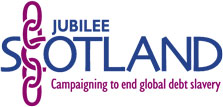| |
| Economics |
| Environmental
Studies |
| Geography |
| Modern
Studies |
| Religious,
Moral and Philosophical Studies |
| |
| Economics |
| 14+ |
Global Trade |
| |
Debt is a key factor in
determining developing country export strategies, and declining terms
of trade has undermined the ability of many poor countries to repay
their debts. |
| |
| Environmental
Studies |
| S1/S2 |
People and society
|
| |
Level F -
Includes a strand in which students "describe and give some of
the reasons for debt - individual and international." World debt
also connects with the strand in which students "explain some
factors that account for differences in individual and national wealth." |
|
Conflict and decision-making
in society |
| |
Level E
- "Identify the ways that citizens
can participate in decision-making through elections and pressure
groups at local, national and international level." |
| |
Level F -
"Explain the ways in which campaigns, media and pressure group
activities can influence public opinion." |
| |
| Geography |
| 14 - 16 |
Includes the aim "to
develop a continuing interest in the |
| |
environments and communities
of the world". |
| |
This offers considerable
scope to explore the debt issue as an illustration of global interdependence
and a cause of poverty. |
| Higher |
Global Issues |
| |
Development
and Health |
| |
| Modern
studies |
| Standard Grade |
International Relations
|
| |
Power -
Exploring the ways in which rich lenders can exert control over governance
in indebted poor countries. |
| |
Equality -
Assessing the fairness of the current debt relief process and exploring
the equity of alternative models. |
| |
Rights and responsibilities
- Discussing whether poor countries should
meet their debt obligations or have a right to default on debts they
consider unjust. |
| Intermediate |
International Issues |
| |
Study Theme 9: Issues in an Emerging
Nation / South Africa |
| Higher |
International Issues |
| |
Study theme 7: A Society in Change
/ South Africa |
| |
Study theme 11: Global Security
- Full or partial state collapse is a consequence
of national bankruptcy and can turn poor countries into exporters
of conflict, crime, environmental problems and disease. |
| |
Study theme 12: Politics of Food
- Reforms imposed by creditors on indebted
poor countries have led to massive increases in the cost of basic
foods. |
| |
| Religious,
Moral and Philosophical Studies |
| Intermediate 2 |
Justice in the World |
| |
Many people in developing countries
believe that their debt obligations are unjustly imposed. |
| Higher |
Religious perspectives in
a secular context |
| |
Rich and poor |
| |
The environment
- Discussion around the concept of ecological
debts owed by rich to poor for their exploitation of natural resources. |
| |
|
| |
|
|
